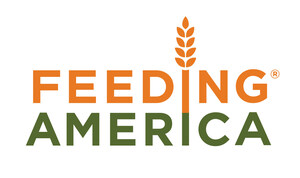
Study: Food Assistance Shifts from "Emergency" to "Chronic"
Food Banks Report Increase in Frequency of Use
CHICAGO, Sept. 28, 2011 /PRNewswire-USNewswire/ -- A new study, Food Banks: Hunger's New Staple, released today by Feeding America finds that many Americans chronically depend on food pantries and other charitable food services to feed themselves and their families. The study provides an inaugural in-depth look at the frequency and duration in which low-income families seek food assistance from food banks and the agencies they serve.
Food Banks: Hunger's New Staple study found emergency food from pantries is no longer being used to meet temporary acute food needs – instead, for the majority of people seeking food assistance, food pantries are now a part of households' long term strategies to supplement monthly shortfalls in food.
The guiding analysis plan for this study involved the utilization of a pantry frequency question among clients surveyed for the Hunger in America 2010 project. Feeding America is comprised of more than 200 food banks that provide food and groceries to more than 61,000 agencies, including food pantries, soup kitchens and other emergency feeding sites.
"Feeding America was created to ensure individuals and families had access to food in an emergency. This study confirms a trend we've been experiencing over the past several years due to a weakened economy--many people are now turning to us on a consistent and ongoing basis to meet their basic nutritional needs," said Vicki Escarra, president and CEO of Feeding America.
"The report illuminates two important situations that millions of low-income Americans are facing -- first, seniors in need rely on us much more heavily than the general population; and, secondly, people enrolled in the Supplemental Nutrition Assistance Program (SNAP, formerly known as Food Stamps) need additional help from our food banks. SNAP benefits do not go far enough in helping families meet their basic nutritional needs," Escarra said.
Among the key findings of the report are:
- A majority of people visiting Feeding America food pantries (54 percent) have used a food pantry for at least six months or more during the past year.
- More than one third of all people visiting food pantries (36 percent) report having used a food pantry at least every month within the past year.
- These clients also report they have used a food pantry for more than 28 consecutive months, on average.
- Among the elderly, well more than half (56 percent) are long term recurrent pantry users, suggesting that the fixed incomes of elderly may be insufficient to provide for basic needs.
- The study found seniors are disproportionately affected in becoming frequent or recurrent users. One out of three recurrent clients are 60 years of age or older.
- Among clients currently receiving SNAP benefits, more than half (58 percent) are recurrent or frequent users.
- Households that are food secure are more likely to have recurrent clients than other types of households. Although we cannot state this relationship to be casual in nature, it is preliminary evidence that in terms of food security, food pantry use over longer durations may lower the likelihood of food insecurity.
"The findings in this report are further evidence that millions of Americans rely on both federal nutrition programs and Feeding America and other charitable organizations to nourish themselves and their families during our nation's tough economic times. Funding for all programs that help our low-income American's must remain strong," Escarra said.
For more information, go to http://feedingamerica.org/HungersNewStaple
About Feeding America
Feeding America provides low-income individuals and families with the fuel to survive and even thrive. As the nation's leading domestic hunger-relief charity, our network members supply food to more than 37 million Americans each year, including 14 million children and 3 million seniors. Serving the entire United States, more than 200 member food banks support 61,000 agencies that address hunger in all of its forms. For more information on how you can fight hunger in your community and across the country, visit http://www.feedingamerica.org. Find us on Facebook at facebook.com/FeedingAmerica or follow our news on Twitter at twitter.com/FeedingAmerica.
Contact:
Ross Fraser
312.641.6422
SOURCE Feeding America







Share this article